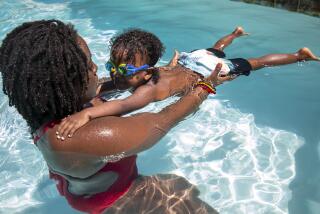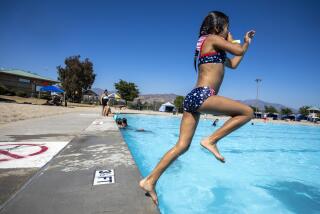Alarming News
- Share via
Swimming pool alarms are showing up more often in backyards as wary parents try to combat a mournful nationwide statistic: More than 350 children drown in pools every year. But according to a recent government study, the safety offered by the alarms may not be sure.
Only three out of five alarms tested by the U.S. Consumer Product Safety Commission performed well enough to warrant the group’s recommendation, and then only when used with other preventive measures.
Alarms--when used properly--can be helpful, commission spokesman Russ Rader said. “But a pool alarm is no substitute for adult supervision and making sure that you have multiple layers of protection . . . [like] a fence around the pool or self-latching gates,” he said.
This information has special significance in Southern California, where water activities are part of the culture. In Orange County alone, 88 children younger than 5 have drowned since 1991.
There are three types of pool alarms: one detects motion on the surface, another is sensitive to underwater disturbance and the third is a child’s wristband that sounds when it gets wet. All three offer remote receivers that also sound inside the house.
The commission recommended three brands: Poolguard, an underwater alarm manufactured by PBM Industries; Sentinel LINK, by Lambo Products Inc., also an underwater model; and PoolSOS, by Allweather Inc., a surface alarm.
Wristband alarms were not encouraged because they can sound when they come in contact with any water--even tap water.
Rader said the other alarm tested by the commission, a surface variety, was ineffective and is under investigation. He would not give the alarm’s name.
Underwater alarms seem to work best, as they can be used in conjunction with pool covers and are least likely to sound falsely. They sounded 100% of the time, according to the government study, whereas the surface alarms only sounded during 60% of the tests.
The alarms took 16 to 166 seconds to go off, sometimes too late to help a child. Brain damage from drowning generally occurs within four minutes, fire officials said.
This is why the commission stresses using several protective devices; Rader hopes that people don’t get a false sense of security when using a pool alarm.
The commission estimates alarm sales have doubled since 1994, to about 24,000 annually. They can cost from $49.99 for an inexpensive surface alarm up to $300 for a deluxe underwater model.
Alarms are stocked at some pool supply stores, available through special order at most shops and can be purchased over the Internet.
At Aladdin Pool Supplies in Costa Mesa, about six Pool Patrol surface alarms are sold per year. Almost all of them are returned, manager Jim Brown said, because that model only lasts about six months. Brown cautioned customers against depending on an alarm: “It can’t replace keeping an eye on kids.”
For ultimate safety, the commission recommends a fence or wall--at least four feet high--around the pool’s perimeter. Alarms on doors that lead directly to the pool area are now required on new homes. Other precautions include self-latching, padlocked gates and a surface barrier, such as a net or plastic cover when the pool is not in use.
And always, always, Rader advised, keep an eye on the water.
(BEGIN TEXT OF INFOBOX / INFOGRAPHIC)
Pool Safety Tips
* Never leave young children unsupervised even for just a few seconds.
* Fence the area to keep people from using the pool without your knowledge.
* Keep children away from pool filters, as the suction force may injure them or prevent them from surfacing.
* Be sure all pool users know how to swim. Learners should be accompanied by a good swimmer.
* Don’t swim alone or allow others to swim alone; make sure someone nearby can answer a distress call.
* Check the area regularly for glasses, bottles, toys or other potential accident hazards.
* Keep CD players, radios and other electrical devices away from wet surfaces.
* Don’t allow anyone who has been drinking alcohol to use the pool.
* Stay out of the pool during rainstorms or when it’s thundering or lightning.
* Treat diving boards with respect. Never dive into an above-ground pool; check the water depth before plunging into an in-ground pool. Also keep clear of the area near a diving board.
* Don’t swim if you’re tired or just finished eating.
Source: Insurance Safety Institute
More to Read
Inside the business of entertainment
The Wide Shot brings you news, analysis and insights on everything from streaming wars to production — and what it all means for the future.
You may occasionally receive promotional content from the Los Angeles Times.










